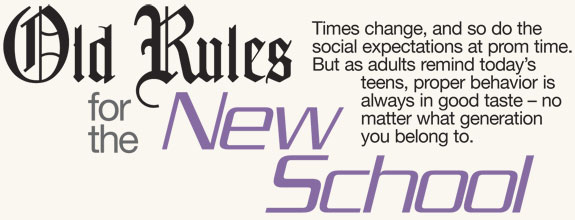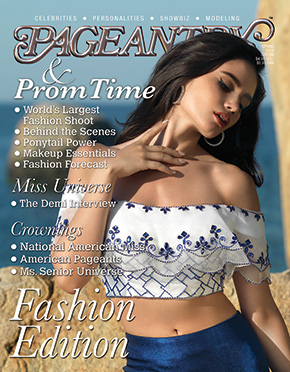


|
 |
You often hear the phrase “It ain’t like it used to be” when speaking to middle-aged and older adults about the way young people approach prom season today. Compared with decades past when today’s adults were teens, Millennium Generation young people have an appreciably greater amount of freedom and financing at their disposal for their prom celebrations than the oldies could ever have imagined. Yet, as many of today’s adults would agree, along with the loosening of the rules of etiquette and the purse strings, the Millennials shouldn’t forget to abide by some tried-and-true prom guidelines that were cherished in their elders’ relatively more austere era.
Comparing the style and behavior of today’s prom-aged teens with yesteryear’s prompted some animated responses from the adults I spoke with for this prom-themed issue of Pageantry and PromTime. Madeline Zachary, a resident of Kalamazoo, Michigan, and an etiquette instructor, attended high school in 1967. Back then, she recalled, it was “just unheard of for high school students to rent hotel rooms for post-prom partying” as is increasingly common today. Instead, she said, “Strict rules applied and you would stay out late, but you were expected home the same night.”
Prom ‘08: How To Make It Great
• Dress with modesty and good taste; it’s not a freak show
• Plan ahead and be prompt
• Show respect and maintain your dignity
• Avoid PDAs (public displays of affection)
• Keep the flower exchange tradition
• Be mindful of your choice of words; no profanity
• Don’t forget to compliment your date verbally
• Guys, don’t ignore your date once your buddies arrive
• Girls, don’t text message your friends; give your date the attention he deserves
• Girls and guys: Cell phone use is a no-no
• No date-swapping; leave the prom with the person who brought you
• In a group, tone down your voices and behavior; it’s a prom, not a sporting event
• Don’t become a statistic by drinking and driving, abusing drugs, or acting in a promiscuous and irresponsible manner |
Barbara Parker, a Hollywood jeweler to the stars, echoed Madeline’s sentiments in recalling her 1965 prom experience in Houston, Texas, where she grew up prior to relocating to California. Barbara remembers her mom and dad were “extremely old school,” as she put it, and imposed much greater restrictions on public displays of affection (PDA) than is commonly seen today. “PDA was a no-no,” Barbara said, using the modern abbreviation with some irony. “If a guy even thought he wanted to touch my leg, my mother promised to cut his hands off!” Barbara also found it appalling that many parents today will tell their teenage children, “If you’ll be drinking, don’t drive” — which, as she correctly points out, implies approval of the use of alcohol and other dangerous substances.
Back Then, It Took a Neighborhood
Back before much of the geographical expansiveness in society was shrunken by around-the-clock cable TV news and Internet communities, what happened during prom season used to be very important for the immediate family and nearby neighbors as well as prom-goers themselves. For Kathy Serrano, a self-described “soccer mom” who grew up in the 1980s as a popular cheerleader in a small town in Oklahoma, prom was practically “a bigger deal for my mother than it was for me,” she said. Kathy recalled that her mother threw a big pre-prom party at their home, where all her mother’s closest friends and neighbors were invited to witness the arrival of Kathy’s date. Compared with that spectacle, many of today’s families would be hard-pressed to identify their neighbors, let alone invite them to participate in their daughter’s pre-prom party. Also, as Kathy pointed out, today’s teens would probably balk if they were asked to subject themselves to such a public inspection.
Today, the More the Merrier
When speaking with recent high school graduates about their prom experience, I was interested to hear the verbal shift from the adults’ use of “us” to the teens’ use of “me.” Their focus was more on the material lavishness and less on the romantic experience. Whereas for aging adults prom often was their first opportunity to attend a formal dance and express serious love, today’s students have often already attended cotillions or balls prior to their prom. Moreover, society’s increasing acceptance of older singles today means that, by the time prom rolls around, today’s prom goers are experts at living for the moment without feeling any pressure to make what their parents might term a “heavy” commitment.
Indeed, though often thought of as more sexually experienced than their elders, post-Millennium teens actually have lower expectations for their prom partners physically than in the days when serious high school relationships often led to engagements and marriage among prom dates shortly after high school graduation. It’s not unusual for some young women today who, without a serious relationship and with no date, instead decide to attend their prom with a group of girlfriends. With the disconnect between prom and a courtship that could lead to marriage, today’s prom-goer is more likely to treat the occasion, as one teen told me, “as just a party that you can have fun at without the implied long-term commitments.”
Old Rules for a New Age
With today’s party-hardy atmosphere and greater affluence added in, though, this generation has turned what used to be a simple date into, in some cases, an extreme competition for showing off and showing up others. The new school of thought among some prom attendees is to seek to impress their friends, spending large sums on more expensive outfits, hairstyles, elite dining experiences, and pre-party and after-party activities. In this material world, prom activities that used to start and end within an evening a couple of decades ago, may now begin at 12 noon with the pre-parties and limo rendezvous and can often extend into the next afternoon.
Even though these generational differences are pushing the envelope of acceptable prom celebrations, most of us can agree the purpose of the prom is to have an experience that will be cherished for a lifetime. In order for that to happen, a level of decorum needs to be maintained. The bottom line is to adopt rules of etiquette that promote mutual respect, support safety and security, and maintain personal dignity — ideals that never grow old.
|
Tanya Hutchison is a model and beauty advisor with Arbonne International in California. An expert in the skin-care industry, etiquette advisor, and modeling instructor, she is the author of a book entitled, Beauty Is a Journey Not A Destination: A Girl’s Personal Guide to Beauty and Etiquette. Her web site is t.myarbonne.com. |
| |
| |
| |
w
|



YOU CAN GET IT ALL!
Click and see for yourself!

|
|
